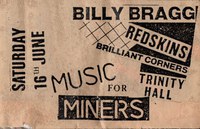Artists for Miners
The decline in the mining industry led to one of England’s most bitter and divisive industrial disputes. The long-running drop in coal production and the closure of British collieries accelerated rapidly in the post-war years. Unrest in the coal industry in response to closures and wage restraint led to a series of unofficial strikes before the major dispute in 1984. But whereas previous governments had tried to come to an agreement with the mining unions around pit closures the Thatcher government was bent on meeting industrial dispute head-on. In Arthur Scargill, head of the National Union of Mine Workers, the government found a worthy opponent. 26-million-person days were lost to the strike a number only exceeded by the 1926 General Strike. The strike came to an end when it was ruled to be illegal by the Government as the Union had not balloted all it’s members before taking action.
The strike was a rallying point for left-wing activists and artists across the country. Across the country punk, LGBT+ expressed solidarity with the miners through benefit gigs for example left wing skinhead group the Redskins – played a benefit gig at the Trinity Centre in support of the miners just before the venue’s closure in 1984.
In addition to benefit concerts the miners' strike inspired the formation of new movements such as Women Against Pit Closures.
Sonia Climie described her experience as part of WAPC as part of her wider involvement with the Red Notes choir. Sonia is a longstanding member of the Red Notes Choir. The Bristol based Red Notes perform a selection of songs from countries around the globe with historical, union, peace, environmental, and human rights themes.
This is an oral history interview gathered through the Art of Resistance project at the Trinity Centre.

